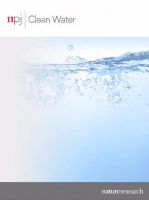
npj Clean Water
Scope & Guideline
Advancing water science for a sustainable future.
Introduction
Aims and Scopes
- Water Treatment Technologies:
Research on advanced water treatment methods, including membrane technologies, bioreactors, and photocatalytic processes aimed at removing contaminants and improving water quality. - Sustainable Water Management:
Studies that emphasize sustainable practices in water management, including resource recovery from wastewater, water conservation techniques, and the integration of water-energy nexus approaches. - Pollution Monitoring and Control:
Research dedicated to monitoring water quality, understanding pollution pathways, and developing methods to mitigate the impact of pollutants, particularly in urban and agricultural contexts. - Public Health and Water Safety:
Investigations into the health impacts of water quality, including the presence of pathogens and contaminants, and the effectiveness of point-of-use treatment technologies. - Emerging Contaminants:
Focus on the detection and remediation of emerging contaminants, such as pharmaceuticals and personal care products, in aquatic environments. - Innovative Materials and Nanotechnology:
Exploration of new materials, including nanomaterials and hybrid systems, for enhanced performance in water treatment applications.
Trending and Emerging
- Resource Recovery from Wastewater:
An increasing number of studies focus on recovering valuable resources, such as nutrients and energy, from wastewater, underscoring a shift towards circular economy principles in water management. - Smart Water Management Technologies:
There is a growing emphasis on the use of smart technologies, including machine learning and IoT applications, for optimizing water treatment processes and improving water quality monitoring. - Microbial and Bio-inspired Solutions:
Research into the use of microbial processes and bio-inspired designs for water treatment is gaining traction, reflecting a trend towards sustainable and natural solutions. - Impact of Climate Change on Water Resources:
Studies addressing the implications of climate change on water availability, quality, and management practices are increasingly prevalent, highlighting the urgent need for adaptive strategies. - Integrated Approaches to Water-Energy Nexus:
Emerging research explores the interconnectedness of water and energy systems, focusing on technologies that optimize both resource use and environmental impact. - Advanced Materials for Water Purification:
The development of novel materials, such as nanocomposites and hybrid membranes, for enhanced water purification processes is a prominent theme, reflecting innovation in material science.
Declining or Waning
- Traditional Water Treatment Methods:
There appears to be a waning focus on conventional treatment methods, such as standard filtration and chlorination, as more innovative and efficient technologies gain prominence. - Simple Desalination Techniques:
Research on basic desalination methods has decreased as the journal shifts towards more complex, integrated systems that combine desalination with other processes like resource recovery. - Static Water Quality Assessments:
The journal has moved away from purely static assessments of water quality towards dynamic, real-time monitoring and predictive modeling approaches. - Single-Contaminant Studies:
There is a noticeable decline in studies focusing solely on single contaminants, as the trend shifts towards understanding the interactions and cumulative effects of multiple pollutants. - Conventional Wastewater Treatment:
Research on traditional wastewater treatment practices is less frequently published, as the focus has shifted towards advanced oxidation processes and hybrid systems that enhance efficiency and sustainability.
Similar Journals

E-Water
Transforming Knowledge into Action for Water SustainabilityE-Water, published by the European Water Association, is a leading academic journal focused on the multifaceted field of water resource management and environmental sustainability. With the ISSN 1994-8549, this journal serves as a vital platform for researchers, professionals, and students dedicated to advancing knowledge in water science and related areas. Although currently not an Open Access journal, E-Water provides in-depth peer-reviewed articles, ensuring high-quality research dissemination. The journal is committed to showcasing innovative studies on water quality, conservation, and policy-making, making significant contributions to the field of water management both locally and globally. As water scarcity and environmental challenges continue to rise, E-Water stands as an essential resource for those involved in the stewardship of our most vital natural resource.

Environmental Engineering Research
Championing research that protects our planet.Environmental Engineering Research, published by the Korean Society of Environmental Engineers (KSEE), stands as a pivotal journal in the field of environmental engineering. With an ISSN of 1226-1025 and an E-ISSN of 2005-968X, this esteemed journal has shown remarkable growth since its inception, converging years from 2011 to 2024. The journal is recognized in the Scopus ranking system, holding a position of #46 out of 197 in the Environmental Science category, marking it in the 76th percentile—a testament to its impact and significance in the field. Furthermore, it enjoys a commendable Q2 ranking in Environmental Engineering for 2023. While the journal operates under a traditional access model, its commitment to disseminating vital research and innovative solutions for environmental challenges enhances its appeal to researchers, professionals, and students alike. The Environmental Engineering Research journal invites contributions that advance the understanding and application of engineering principles to environmental issues, providing a forum for scholars dedicated to fostering sustainability and environmental protection.
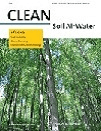
CLEAN-Soil Air Water
Championing Open Access for Environmental AwarenessCLEAN-Soil Air Water, an esteemed journal published by Wiley, serves as a vital platform for disseminating research in the fields of environmental chemistry, pollution, and water science and technology. Operating under an Open Access model, it embraces the principles of knowledge sharing, making significant research findings readily accessible to a global audience. With an ISSN of 1863-0650 and an E-ISSN of 1863-0669, the journal has demonstrated its importance in the academic community, reflected in its Scopus rankings within the top quartiles of its categories. Established in 2007 and continuing through to 2024, CLEAN-Soil Air Water offers researchers, professionals, and students an opportunity to explore innovative studies that address pressing environmental challenges, facilitating an exchange of novel ideas and techniques essential for sustainable development. With a publication footprint in Germany and a growing international reputation, this journal is an invaluable resource for those dedicated to advancing the science and practices of environmental stewardship.
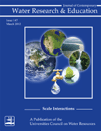
Journal of Contemporary Water Research & Education
Connecting Research and Practice for Water SustainabilityJournal of Contemporary Water Research & Education is a leading publication in the field of water resources, committed to advancing the understanding and management of water-related issues through innovative research and education. Published by WILEY, this journal serves as a vital platform for researchers and practitioners to disseminate knowledge on contemporary water challenges, management strategies, and environmental policies. With an ISSN of 1936-7031 and an E-ISSN of 1936-704X, it provides a wealth of peer-reviewed articles that are essential for anyone interested in sustainable water resource practices. Although it does not currently operate under an open-access model, the journal's comprehensive content remains accessible through various institutional and personal subscriptions. As we face increasing water scarcity and quality issues globally, the Journal of Contemporary Water Research & Education strives to foster collaboration and innovation, playing a pivotal role in equipping scholars, professionals, and students with the knowledge necessary to tackle these pressing challenges.

Water Practice and Technology
Pioneering Research in Water Science and TechnologyWater Practice and Technology is a distinguished open-access journal published by IWA PUBLISHING, dedicated to disseminating cutting-edge research and practical insights within the field of water science and technology. With an E-ISSN of 1751-231X, the journal has been at the forefront of sharing knowledge since its inception in 2011 and has transitioned to open access in 2021, providing unrestricted access to high-quality research articles. Based in the United Kingdom, this journal plays a vital role in advancing the understanding of water resource management, treatment technologies, and environmental sustainability. As of 2023, it is categorized in the Q3 quartile for Water Science and Technology with a Scopus rank of #157/261, placing it in the 40th percentile among its peers. Researchers, professionals, and students alike will find the journal a valuable resource for the latest trends, innovations, and practical applications in the water sector, facilitating a collaborative approach towards addressing global water challenges.

Hydrologie und Wasserbewirtschaftung
Innovating hydrology for a thriving planet.Hydrologie und Wasserbewirtschaftung, published by the BUNDESANSTALT GEWASSERKUNDE-BFG, stands as a vital open access journal in the field of hydrology and water management since its inception in 1999. Based in Germany, this journal aims to disseminate high-quality research related to water resources, environmental sustainability, and innovative management strategies. Though it has a Q4 ranking in Water Science and Technology for 2023, and holds a Scopus rank of 113 out of 225, the journal provides an essential platform for researchers, professionals, and students interested in advancing their understanding of water science. With coverage spanning from 1999 to 2018 and a seamless move to an open access model, Hydrologie und Wasserbewirtschaftung remains committed to contributing to the ongoing dialogue around critical water issues. Researchers looking to publish their findings or stay abreast of developments in water science will find this journal indispensable.
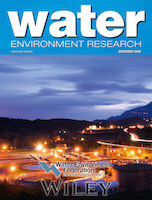
WATER ENVIRONMENT RESEARCH
Pioneering insights in ecological modeling and environmental chemistry.WATER ENVIRONMENT RESEARCH is a leading scholarly journal dedicated to disseminating cutting-edge research in the fields of water science and technology. Published by WILEY, this esteemed journal (ISSN: 1061-4303; E-ISSN: 1554-7531) is renowned for its rigorous peer-reviewed articles that explore critical issues related to ecological modeling, environmental chemistry, pollution, and waste management. Established in 1992 and continuing through 2024, WATER ENVIRONMENT RESEARCH has secured a notable position within its category quartiles, ranking in the Q2 tier for several disciplines, including ecological modeling and water science and technology. It is highly regarded in the Scopus database, holding a rank of #53 out of 261 journals in Environmental Science related to Water Science and Technology, positioning it in the 79th percentile. As it continues to bridge research and practice, this journal serves as an essential resource for researchers, professionals, and students striving to advance knowledge and foster sustainable solutions within the water environment sector.
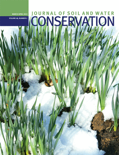
JOURNAL OF SOIL AND WATER CONSERVATION
Transforming knowledge into action for conservation.The JOURNAL OF SOIL AND WATER CONSERVATION, published by the Soil Water Conservation Society, is a leading peer-reviewed journal dedicated to the critical fields of agronomy, soil science, and water conservation. With its inception in 1973 and a convergence period extending to 2024, the journal plays a pivotal role in disseminating innovative research, management practices, and policy analysis aimed at promoting sustainable land and water resource management. The journal boasts an impressive Impact Factor and ranks in the Q1 and Q2 quartiles across key categories, including Agronomy and Crop Science, Nature and Landscape Conservation, and Water Science and Technology. It serves as an essential platform for researchers, professionals, and students to engage with cutting-edge findings that address pressing environmental challenges. Through its commitment to advancing the science of soil and water conservation, this journal remains a vital resource for enhancing ecological integrity and promoting sustainable agricultural practices.
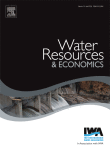
Water Resources and Economics
Bridging Economics and Sustainable Water Management.Water Resources and Economics, published by Elsevier, is a prestigious journal that bridges the gap between water resource management and economic theory. With an ISSN of 2212-4284, this journal has been an essential resource in the fields of Economics, Geography, and Water Science since its inception in 2013. Holding a notable Q2 ranking in the 2023 Category Quartiles for Economics and Econometrics, Geography, Planning and Development, and Water Science and Technology, it showcases cutting-edge research that addresses the increasing importance of sustainable water management in a rapidly changing climate. The journal's rigorous peer-review process ensures the dissemination of high-quality studies that influence policy and practice. As it continues to grow within the academic landscape, Water Resources and Economics strives to provide actionable insights and innovative approaches for professionals, researchers, and students invested in the sustainability and economics of water resources. For additional information, please refer to the journal’s website for access and submission guidelines.
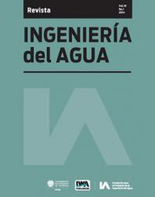
Ingenieria del Agua
Empowering Research for a Water-Secure FutureIngenieria del Agua, published by Universitat Politècnica de València, Editorial UPV, is a prominent open-access journal dedicated to the field of water engineering and management. With its ISSN 1134-2196 and E-ISSN 1886-4996, this journal has been facilitating the dissemination of critical research and innovative practices in water resources since 1994. With a commitment to providing unrestricted access to high-quality research, Ingenieria del Agua aims to serve as a pivotal platform for researchers, professionals, and students alike. Focused on the intersection of hydrology, environmental engineering, and sustainability, the journal encourages submissions that address contemporary challenges in water resource management, promoting advancements that are vital for both ecological conservation and societal needs. By fostering a collaborative academic environment, it plays an essential role in shaping the future of water engineering.